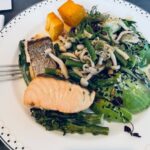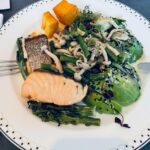Following an anti-inflammatory diet is one of the best things you can do to support your overall health.
Since experiencing chronic inflammation is linked to outcomes like diabetes and heart disease, taking steps to combat this condition is important.
What is Inflammation?
Inflammation is a normal immune response.
From an acute injury to unhealthy lifestyle factors, inflammation can develop for a number of reasons.
When inflammation happens, your body is being alerted that there is an injury or an infection.
There are two types of inflammation:
– Short-term, acute inflammation: developed as a result of something like the flu or a broken leg, and it can support the body’s natural healing process.
– Long-term, chronic inflammation is the one that we need to avoid, caused as a result of long term unhealthy lifestyle, including chronic stress, excessive smoking and drinking, poor sleep, and unhealthy food choices .
Fortunately the food we choose to eat can either promote or combat inflammation.
‘Pro-inflammatory’ food can stimulate an inflammatory response in your body, while anti-inflammatory foods may reduce inflammation in the body and promote overall health.
• Walnuts – containing a unique fatty acid called alpha-linolenic acid, or ALA.
This healthy fat is an omega-3 fatty acid that has anti-inflammatory properties and is a perfect nut to include in many diets, including an anti-inflammatory one.
Walnuts can be used as a topping for porridge, crushed and used as a coating for fish and chicken, add to any smoothies or simply enjoyed on their own.
• Salmon: Fatty fish like salmon, herring, tuna, and trout are naturally loaded with DHA and EPA omega-3 fatty acids, key nutrients that help keep chronic inflammation under control.
As long as your salmon isn’t fried, enjoying it as a healthy meal along with a serving of whole grains, sweet potatoes and vegetables is a fantastic choice for your anti-inflammatory diet.
• Berries: Raspberries, strawberries, blueberries; all berries are a powerhouse when it comes to managing inflammation.
Colourful berries contain antioxidants that have anti-inflammatory properties.
Try adding berries to your smoothie, yogurt, porridge or your fruit salad, enjoying these can fuel your body with some amazing benefits.
• Beetroot: Freshly sliced, roasted, pickled, or boiled, beetroots are one of the best foods to eat to combat inflammation. Alternatively, yiu can add beets to your smoothies.
Bets are rich in folate, a vitamin that plays a key role in growth, development, and heart health.
They also contain manganese, which is involved in bone formation, nutrient metabolism, brain function,
Beets are loaded with vitamins and minerals yet low in calories and fat.
• Carrots have great anti-inflammatory properties due to their Vitamin A and Beta-carotene content, believed to help fight inflammation for those who suffer with joint pain.
Many other orange-coloured vegetables such as butternut squash and sweet potatoes have the same benefits as well.
Unlike most vegetables, carrots are believed to have a higher nutritional content when they are cooked rather than eaten raw.
When trying to fight off joint pain it would be helpful to add carrots to your daily diet.
• Chia seeds are small and mighty superfood. They originally come from Mexico and in history were often consumed by Aztec warriors for strength.
The word chia actually translates to strength according to the Mayan language.
Chia seeds are a great anti-inflammatory food because they contain 3:1 of omega 3s to omega 6s. Omega 3s can reduce inflammation whereas omega 6s could increase it.
• Ginger: we are sure we have all heard it before, ginger has excellent benefits for our bodies.
It is recommended to help relieve the common cold and nausea but also can be an excellent anti-inflammatory agent.
Ginger most importantly can help with osteoarthritis (degeneration of the joints in the body).
This is due to the main bioactive compound called gingerol. The medicinal properties in gingerol are making it a powerful anti-inflammatory food.
Ginger comes in fresh, dried, powdered and oil form making it easy to add to the everyday diet.
Simply add it to your smoothies, stir fry or add it to hot water, honey and lemon as DIY herbal tea.










